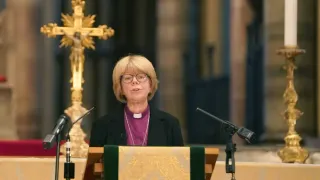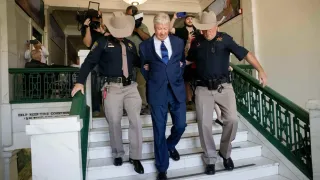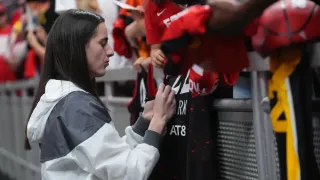
4 hours ago
Champion Runner Caster Semenya Ending Legal Fight Against Sex Eligibility Rules, Lawyer Tells AP
Gerald Imray READ TIME: 3 MIN.
Olympic champion runner Caster Semenya is ending a seven-year legal challenge against sex eligibility rules in track and field, her lawyers said Thursday, despite winning a ruling at the European Court of Human Rights in July that appeared to have reignited one of sports' most contentious cases.
Patrick Bracher, a lawyer for Semenya, said in an email to The Associated Press that they wouldn't take her appeal back to the Swiss supreme court, which was an option and what many presumed to be Semenya's next step after the European rights court ruling.
“Caster’s legal challenge reached the highest possible court with a highly successful outcome and will not be taken further in the circumstances,” Bracher wrote.
Semenya is a two-time Olympic gold medallist in the 800 meters from South Africa who has been banned from running in her favorite race at major international meets like the Olympics and world championships since 2019 because she refused to follow the rules and take medication to artificially reduce her hormone levels.
Since 2018, she has taken her legal battle against the rules enforced by track governing body World Athletics to three courts; the Switzerland-based highest court for sports, the Swiss Federal Tribunal and the European Court of Human Rights.
She has argued that the rules infringed her rights. She lost her appeals at the Court of Arbitration for Sport and at the Swiss Federal Tribunal.
However, the European Court of Human Rights ruled in July that she hadn't had a fair hearing at the Swiss tribunal and it hadn't properly considered some of the complex arguments. That opened an avenue for her to continue her challenge.
Semenya was the world's dominant middle-distance runner and was unbeaten in more than 30 races when she was barred. Now 34, she has moved into coaching, with the regulations effectively ending her career.
She has been the face of fiercely contentious sex eligibility rules in sports since she won the world championships as a teenager in 2009 and was forced to undergo sex verification tests. Semenya has one of a number of conditions known as differences in sex development, or DSD. She has the typical male XY chromosome pattern but also female physical traits and high levels of naturally occurring testosterone. DSD conditions are sometimes called intersex conditions.
Semenya is not transgender despite her case often being conflated with the divisive debate over the participation of transgender athletes in female competitions. She was identified as female at birth, raised as a girl, and has always identified as female.
World Athletics says Semenya and a small number of other DSD athletes in international track have testosterone levels in the male range, giving them an unfair advantage over other women because of the hormone's connection to muscle mass and cardio-vascular performance.
How much advantage DSD athletes gain from testosterone has been disputed in one of the many complex details of Semenya's landmark case.
Track and field introduced new rules governing women with high natural testosterone in 2011 in a move seen as a direct response to the arrival of Semenya. The regulations have been made stricter over the years and the latest rule change introduced earlier this year moves away from monitoring testosterone and requires women competing in international track to undergo a genetic test to check for the presence of a Y chromosome.
If they fail the one-off genetic sex eligibility test, they are banned from female competitions. The new rules came into effect Sept. 1 ahead of last month's world championships.
Bracher noted in his email to the AP that the current regulations are very different to those Semenya challenged in court when her case started seven years ago. But Semenya's recent victory at the European rights court might provide a basis for a new challenge by another athlete against the current regulations, he said.
While Semenya's case made track and field the main battleground over sex eligibility for nearly two decades, other high-profile sports like swimming have moved to block women with DSD conditions from competing. Semenya's case was often seen as a precedent for other sports to introduce their own restrictions.
Boxing was mired in a sex eligibility scandal at the Paris Olympics last year over the participation of Imane Khelif of Algeria and Lin Yu-ting of Taiwan after officials claimed they had previously failed unspecified sex verification tests.
Boxing has now also introduced genetic sex tests and Khelif, who won a gold medal in Paris, has followed Semenya and appealed against them at the Court of Arbitration for Sport.






